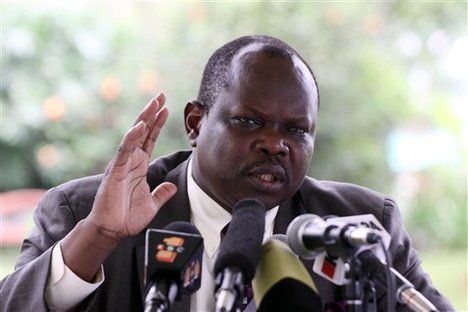
ADDIS ABABA, Ethiopia — The usual hubbub in the lobby of the Sheraton Addis was notably absent on the morning of the fourth day of negotiations between Sudan and South Sudan. Participants of oil talks between the two states lounged in the lobby area, sipping coffee and typing on laptops, waiting for the next meeting on oil to be convened. The afternoon before, the two parties had conveyed what appear to be each side’s opening bids to the A.U. High-Implementation Level Panel on the way forward from the current oil impasse.
In an interview with Enough, lead negotiator Pagan Amum said that the southern government will resume talks on the condition that Khartoum pays for the value of southern oil Khartoum has confiscated, releases vessels carrying shipments of oil from Port Sudan, and guarantees that no further unilateral actions would be taken by the Sudan government going forward. Reportedly, the South Sudan government also asked for compensation for damages incurred because of Khartoum’s actions. According to documents furnished by the South Sudan government, Sudan has taken 1.4 billion barrels of oil, and intends to divert 120,000 barrels of oil a day going forward.
The South’s lead negotiator also said that Khartoum will have 48 hours to fulfill these conditions before a shutdown of the pipelines is imposed.
A press release issued by the Sudan government yesterday asserted that Khartoum was entitled to taking, in-kind, the amount of fees it is owed by Juba for the use of oil infrastructure in northern territory:
The GoS has since 9th of July 2011 presented invoices to the GoRSS to cover the costs for processing and transporting GoRSSs crude oil together with a transit fee without receiving any payment from GoRSS up to date. The GoS has decided accordingly to take its entitlements of transit fee and other service fees in kind in conformity with recent legislation passed by the GoS. (…) [T]he allegations that the oil was stolen are baseless and unfounded.
Reportedly, the Khartoum government reiterated a similar position in their meeting with the A.U. panel.
With the two sides’ positions far apart, talks on oil have come to a temporary pause this afternoon. The parties are waiting for the next move from the A.U. panel, tasked with the unenviable job of bringing the two positions closer together. It remains to be seen if the pressures created by the presence of oil companies and now, the South’s 48-hour ultimatum, will yield any progress. In the meantime, this standoff has distracted from a necessary discussion on the long-term oil relationship between Juba and Khartoum.
Photo: South Sudan lead negotiator Pagan Amum (AP)

